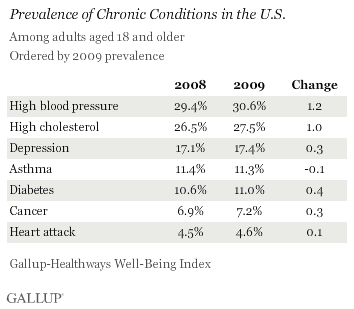WASHINGTON, D.C. -- While policymakers spent much of 2009 focused on healthcare legislation, more Americans reported being diagnosed with high blood pressure, high cholesterol, diabetes, depression, and cancer. High blood pressure continues to be the most prevalent chronic condition in the United States, with 30.6% of adults reporting having been diagnosed with it in 2009, up 1.2 points from 2008. Rates of asthma and heart attack remain essentially unchanged.

The increases in high blood pressure and high cholesterol parallel rises in diabetes and obesity in 2009, previously reported by Gallup. In 2009, Americans also reported exercising less on average than they did in 2008, an important point to note in assessing potential causes of the increases in chronic conditions.
Increases in high blood pressure and high cholesterol are apparent across nearly all key demographic groups. The rates of high blood pressure increased by more than a percentage point among women, men, blacks, whites, those aged 45 to 64, those with annual incomes of less than $24,000 and more than $90,000, and in every region in the country. Blacks, whites, seniors (those aged 65 and older), those with annual incomes of $48,000 or more, and residents of the South, Midwest, and West had increases in cholesterol rates of a percentage point or more.
In contrast, young adults (those between the ages of 18 and 29) had either decreases or no change across all chronic conditions in the 2009 compared with the 2008 survey.
High-Risk Populations: Key Findings
-
Seniors are the most likely to report high blood pressure (58.8%), high cholesterol (49.1%), diabetes (22.1%), and heart attack (12.7%).
-
Low-income Americans (those making less than $24,000 per year) have some of the highest rates of high cholesterol (30.2%), diabetes (15.9%), heart attack (7.3%), asthma (15.7%), and depression (29.4%).
-
Black Americans are disproportionately affected by high blood pressure (39.0%) and diabetes (15.6%).
For a full table of all demographic groups, see page 2.
See "More Americans Report Cancer Diagnoses" for an in-depth read on cancer in the United States.
Bottom Line
It is well-known that tackling the rising rates of high blood pressure and high cholesterol in the United States would have a significant impact on cutting healthcare costs and in reducing the prevalence of related issues such as heart attack and stroke. Gallup data suggest prevention and treatment efforts targeted toward low-income Americans and the black community, two groups that have among the highest rates of multiple chronic illnesses, could go a long way to improving the health of the nation as a whole. And although the battle over healthcare reform may have come to a conclusion, it is clear the country has a long way to go to improving disease prevention.
Learn more about the Gallup-Healthways Well-Being Index.
Survey Methods
Results are based on telephone interviews with more than 350,000 national adults (aged 18 and older) each year, conducted between Jan. 2-Dec. 30, 2008, and Jan. 2-Dec. 29, 2009. For annual results based on the stated total sample of national adults, one can say with 95% confidence that the maximum margin of sampling error is ±0.2 percentage points.
Interviews are conducted with respondents on landline telephones (for respondents with a landline telephone) and cellular phones (for respondents who are cell phone only and cell phone mostly).
In addition to sampling error, question wording and practical difficulties in conducting surveys can introduce error or bias into the findings of public opinion polls.
About the Gallup-Healthways Well-Being Index™
The Gallup-Healthways Well-Being Index measures the daily pulse of U.S. well-being and provides best-in-class solutions for a healthier world. To learn more, please visit well-beingindex.com.

